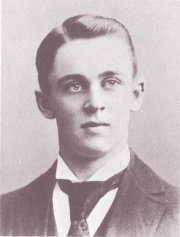Robert Andrews Millikan
Robert Andrews Millikan (March 22, 1876 – December 19, 1953) was an eminent American physicist, renowned for his measurement of the elementary electric charge and for his work on the photoelectric effect. Millikan's experiments and theoretical work in the early 20th century were instrumental in the advancement of quantum physics.
Early Life and Education[edit | edit source]
Robert Millikan was born in Morrison, Illinois, to a family of Northern European descent. He attended Oberlin College, where he completed his undergraduate studies in 1891. Millikan was initially interested in the classics but later shifted his focus to physics. He pursued his graduate studies at Columbia University, where he earned his Ph.D. in physics in 1902 under the guidance of Albert A. Michelson.
Scientific Contributions[edit | edit source]
Millikan's most notable scientific achievement was his oil-drop experiment, conducted in 1909. This experiment allowed him to measure the elementary electric charge with unprecedented accuracy. Millikan's meticulous work on the oil-drop experiment earned him the Nobel Prize in Physics in 1923.
In addition to his work on the elementary electric charge, Millikan made significant contributions to the study of the photoelectric effect, a phenomenon that was crucial to the development of quantum mechanics. His experiments in this area provided empirical support for Albert Einstein's theory of the photoelectric effect, further bridging the gap between classical and quantum physics.
Millikan also investigated cosmic rays, contributing to the understanding of high-energy particles originating from outer space. His work in this area laid the groundwork for future research in astrophysics and particle physics.
Academic and Administrative Roles[edit | edit source]
Throughout his career, Millikan held several prestigious academic and administrative positions. He was a professor at the University of Chicago before moving to the California Institute of Technology (Caltech), where he served as the head of the physics department and later as the president of the institute. Under his leadership, Caltech became one of the leading research institutions in the world.
Legacy[edit | edit source]
Robert Millikan's legacy in the field of physics is profound. His precise measurements and innovative experiments contributed significantly to the understanding of the fundamental principles of physics. Millikan's work laid the foundation for many subsequent discoveries in quantum mechanics and particle physics.
Millikan's dedication to education and research also left a lasting impact on the academic institutions he was associated with, particularly Caltech, where his influence is still felt today.
Controversies[edit | edit source]
Millikan's career was not without controversy. His insistence on the correctness of his value for the elementary electric charge, despite evidence to the contrary, has been a subject of historical debate. Additionally, his views on eugenics and race have been criticized in the context of contemporary values.
Conclusion[edit | edit source]
Robert Andrews Millikan was a pivotal figure in the development of modern physics. His experiments and theories have had a lasting impact on the scientific community, influencing the direction of research in quantum mechanics and beyond. Despite the controversies surrounding some of his views, Millikan's contributions to physics and education remain significant.
Search WikiMD
Ad.Tired of being Overweight? Try W8MD's physician weight loss program.
Semaglutide (Ozempic / Wegovy and Tirzepatide (Mounjaro / Zepbound) available.
Advertise on WikiMD
|
WikiMD's Wellness Encyclopedia |
| Let Food Be Thy Medicine Medicine Thy Food - Hippocrates |
Translate this page: - East Asian
中文,
日本,
한국어,
South Asian
हिन्दी,
தமிழ்,
తెలుగు,
Urdu,
ಕನ್ನಡ,
Southeast Asian
Indonesian,
Vietnamese,
Thai,
မြန်မာဘာသာ,
বাংলা
European
español,
Deutsch,
français,
Greek,
português do Brasil,
polski,
română,
русский,
Nederlands,
norsk,
svenska,
suomi,
Italian
Middle Eastern & African
عربى,
Turkish,
Persian,
Hebrew,
Afrikaans,
isiZulu,
Kiswahili,
Other
Bulgarian,
Hungarian,
Czech,
Swedish,
മലയാളം,
मराठी,
ਪੰਜਾਬੀ,
ગુજરાતી,
Portuguese,
Ukrainian
Medical Disclaimer: WikiMD is not a substitute for professional medical advice. The information on WikiMD is provided as an information resource only, may be incorrect, outdated or misleading, and is not to be used or relied on for any diagnostic or treatment purposes. Please consult your health care provider before making any healthcare decisions or for guidance about a specific medical condition. WikiMD expressly disclaims responsibility, and shall have no liability, for any damages, loss, injury, or liability whatsoever suffered as a result of your reliance on the information contained in this site. By visiting this site you agree to the foregoing terms and conditions, which may from time to time be changed or supplemented by WikiMD. If you do not agree to the foregoing terms and conditions, you should not enter or use this site. See full disclaimer.
Credits:Most images are courtesy of Wikimedia commons, and templates, categories Wikipedia, licensed under CC BY SA or similar.
Contributors: Prab R. Tumpati, MD






